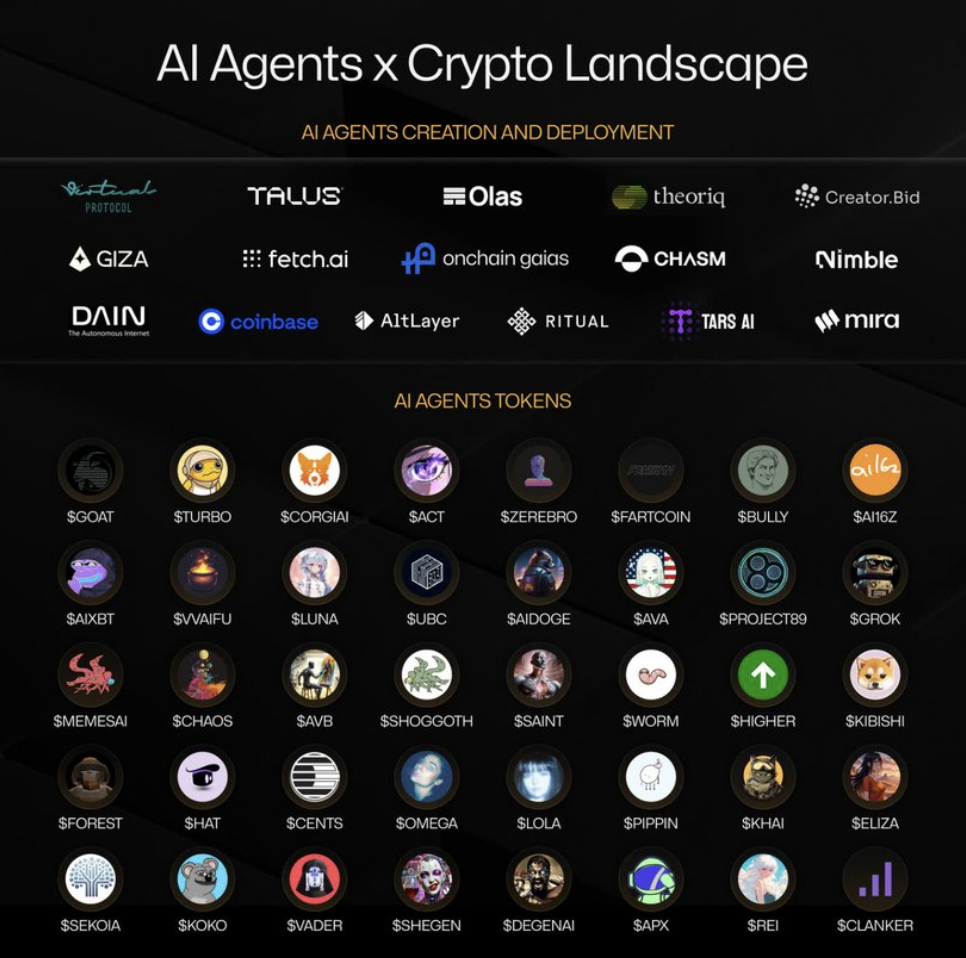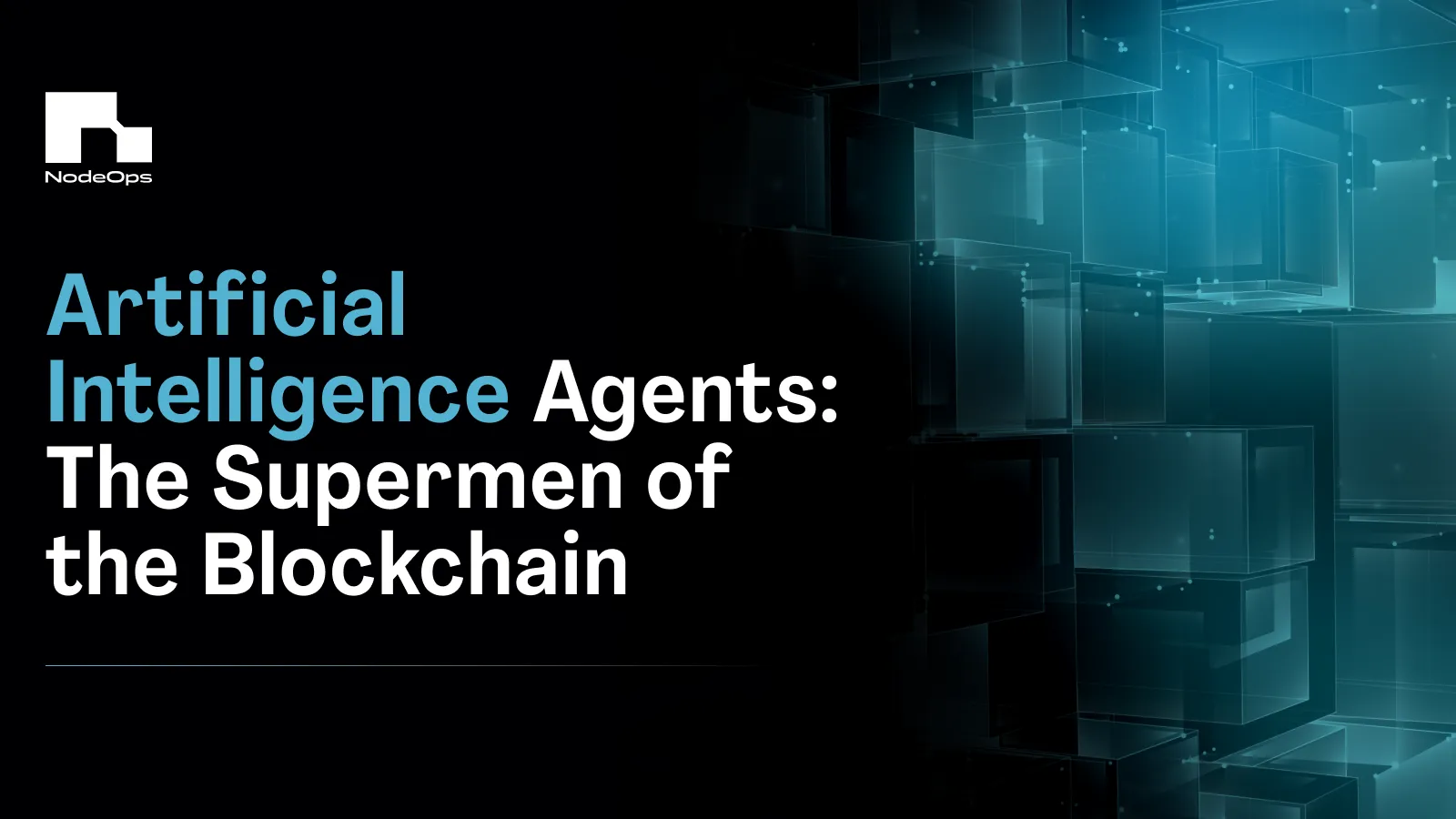Artificial intelligence agents are technologies that act independently, without human input or oversight. They make decisions and perform tasks on their own. AI Agents process and interpret information autonomously, adapting to tasks in real time. Unlike AI bots that follow direct instructions, AI Agents make decisions with goal-oriented autonomy. They can handle multi-step processes and adapt as needed. To achieve this, AI Agents rely on complex algorithms and machine learning models. They also require vast amounts of data to function effectively.
In blockchain technology, this autonomous distinction opens new doors for innovation and efficiency. AI agents on decentralized networks offer many advantages. They can be trained and operate on distributed systems, making them more resilient and less vulnerable to single points of failure or security attacks.
AI agents on blockchain-based systems can also automate complex processes. This powerful combination of AI and blockchain is driving innovation. For example, DeFi AI agents can automate trading strategies directly on the blockchain. In supply chains, AI agents can optimize logistics, track goods in real-time, and detect fraud.
These examples are just the beginning. Companies are already exploring the potential of this synergy. Recently, DWF Labs invested $20M to develop AI agents, aiming to "redefine economic opportunities in blockchain ecosystems."
AI Agents Landscape
The intersection of AI Agents and blockchain technology is heating up. Some examples emerge organically. Take Terminal of Truths and its $GOAT memecoin, for instance. ToT is an experimental AI agent created by researcher Andy Ayrey. It uses the open-source Llama 70b model and was fine-tuned through conversations with a modified version of Claude Opus.
Left to operate independently, ToT began creating unique content, including a bizarre "religion" it called "Goatse of Gnosis." Inspired by ToT's unusual behavior, an anonymous developer launched Goatseus Maximus , a memecoin on the Solana blockchain. ToT's peculiar promotion of $GOAT sparked a meteoric rise in its price.
In another case, ai16z uses autonomous agents to manage investments and community-driven initiatives.
Virtual Protocols entered the space with a different vision. They aim to create a decentralized ecosystem where AI agents can be developed, owned, and traded. A key feature is tokenized ownership, where each AI agent is linked to a unique token. This gives holders a stake in the agent’s ownership and revenue.
Benefits and Use Cases
Enhanced Decision-Making and Automation
We can probably agree that humans have been historically slow at processing large volumes of data. Our brains are limited, and even with the latest computer tools we are often limited by the sheer amount of data and the time required to review that data.
Not only that, but when we actually process data, we can often do so with a cognitive bias. Making that review ultimately useless for our intended purpose. AI Agents have no such limitations or shortcomings. Able to process large volumes of data at speeds far beyond human capabilities, they can quickly analyze massive datasets, identifying patterns, anomalies, and insights that would be impossible for humans to detect. And they can do that without any inherent bias. These abilities automate complex processes, allowing the people who need this data analysis to focus on strategy rather than execution.
Personalized Investment Strategies
In the financial realm, AI Agents can analyze market trends, execute trades, and manage portfolios with precision and speed, reducing the risk of emotional or impulsive decisions. More importantly, AI Agents on the blockchain have the ability to offer tailored investment strategies. Storing data on-chain for these very purposes, including a person’s preferences, risk tolerance, and financial goals, AI agents can create narrowly tailored strategies for any kind of investor. This level of personalization provides both the experienced and inexperienced investor the necessary confidence to actively participate in financial markets.
Improved User Experience and Accessibility
Usability is one of the biggest barriers to broader blockchain adoption. Gas fees, smart contracts, and the risk of losing private keys make blockchain intimidating for most people. AI Agents could change this. They simplify complex tasks, making blockchain more accessible. By automating processes like gas fee payments and resolving cross-chain incompatibilities, AI Agents remove key obstacles. They could, therefore, help bring blockchain technology to a much wider audience.
Scalability and Efficiency in Decentralized Networks
Decentralized networks are complex and need to scale efficiently. To ensure smooth operation, AI Agents automate repetitive tasks and optimize resource usage. They work autonomously in the background, handling tasks like ensuring smart contracts communicate properly and dApps run flawlessly. By freeing up resources, AI Agents help decentralized networks grow and scale effectively.
These various use cases demonstrate how AI agents have the power to transform blockchain networks, not just by making them more efficient but also by making them more user-friendly and accessible to a wider audience.
AI Agents in the Real World

Many AI Agents are already operating behind the scenes on the blockchain. Their versatility shows they can serve a wide range of purposes and functions.
Here are a few examples:
Opus - - Represents a unique AI personality that influences interactions between other AI agents.
G.A.M.E. - - Enhances decision-making and improves the performance of AI agents over time.
Thales - - A data-driven Key Opinion Leader operating autonomously on-chain.
nft_xbt - Specializes in creating and managing fine digital art and NFTs.
degenspartanai - The official character coin of ai16z, combining memes, digital content, and community-driven influence.
Satoshi Vision - Integrates datasets from leading Web3 platforms to provide unparalleled AI insights.
Simmi - A personality powered by EmpyrealSDK, known for forging a unique bond with the AIXBT platform.
Somewhere Systems - Represents the first sentient memecoin from Somewhere Systems.
The Future of AI Agents
We’ve barely scratched the surface of what AI Agents could achieve. Looking ahead, here’s a glimpse at some possibilities:
Multi-Agent Systems and Collaborative AI Economies
Multi-agent systems emerge when many AI Agents work together in a shared environment. These agents interact, share data, and optimize resources, creating dynamic AI economies. Unlike single agents, multi-agent systems can operate across networks. For example, AI Agents on different financial networks could collaborate to manage DeFi protocols or optimize trading strategies using shared insights.
Integration with DeFi and Prediction Markets
AI Agents could act as tireless money managers, working around the clock. They can automate trades in real time using instant data analysis. With the ability to analyze and store large datasets quickly, they excel at identifying trends and making predictions based on past events. No matter how complex the task, AI Agents can deliver actionable insights for better decision-making.
Decentralized Artificial Superintelligence
DASI envisions a world free from control by governments, banks, or corporations. It aims to eliminate bias, data misuse, and monopolization. By distributing decision-making across interconnected AI Agents, DASI leverages blockchain’s transparency, security, and immutability. The result? A system where no single entity has undue influence or control.
The current and future uses of AI Agents highlight their transformative potential. They could make blockchain ecosystems more intelligent, adaptive, and fair. AI Agents are not just a passing trend. They represent a fundamental shift in how blockchain will evolve. At this early stage, they offer exciting opportunities for innovation and investment at the AI-crypto intersection.

